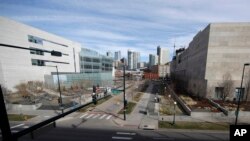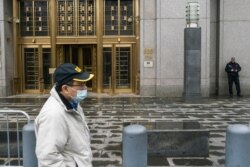Until recently, lines formed daily at Washington's municipal jail as family members waited to see loved ones and lawyers clocked time with their incarcerated clients. That was before the arrival of COVID-19.
Now the detention facility is quiet. Visitors are barred entry. Lawyers confer with clients by video calls.
"I wanted to see my son, but I was turned away," a woman outside the jail who identified herself as Marie told VOA. "With all these health restrictions it looks like I won't be giving him a hug anytime soon."
In a matter of weeks, the coronavirus pandemic has upended almost every facet of America's criminal justice system.
With more than 2.2 million people incarcerated, U.S. health officials fear an outbreak could rapidly spread throughout federal and state prisons as well as local jails. Reports abound of inmates and prison guards testing positive for COVID-19. Health experts and civil liberties advocacy groups have urged correctional facilities to take decisive and unprecedented actions to protect inmates and detainees.
Thousands of prisoners are being released from crowded local jails across the country, according to news reports.
In the nation's capital, 60 inmates were quarantined at the municipal jail after officials initially thought they had had contact with a guard who tested positive for COVID-19.
"The prisoners were returned to the general population after it was determined they were in a different courtroom from the infected employee," said the city government's communications director, Olivia Dedner.
In Fairfax County, a Virginia suburb of Washington, police are conducting a basic screening of those taken into custody. "Deputies ask new inmates if they are experiencing fevers or other symptoms of COVID-19. If they are, they will be given a face mask and isolated," said Andrea Ceisler, a spokeswoman for the Fairfax County Sheriff's Office.
The American Civil Liberties Union, meanwhile, has called on federal, state and local corrections officials to release elderly inmates and others deemed vulnerable to COVID-19, commute sentences that will end in the next two years, and halt arrests for minor offenses. The ACLU also maintains people currently in pretrial detention should be released.
U.S. legal systems slow down
At a time when Americans are being urged or compelled to stay at home, the criminal justice system has seen courthouses closed, trials delayed, and police forces adjust their procedures.
Chief Judge Robert Morin of Washington's Superior Court signed an order that allows city police to release juveniles arrested on warrants for "Failure to Appear" at trial.
In Philadelphia, Police Commissioner Danielle Outlaw suspended arrests for nonviolent criminal offenses. For now, theft, burglary, prostitution, stolen automobiles, vandalism, and narcotics violations will no longer automatically result in detention.
Police will also temporarily stop enforcing bench warrants to individuals who fail to show up for court. Law enforcement officials stress, however, that violent offenders will be arrested, processed and put in jail.
In a sign of the virus' growing impact on first responders, a second Washington police officer tested positive for COVID-19 Tuesday.
Earlier this week, police investigating an illegal fireworks explosion encouraged residents to practice social distancing. Taking witness statements proved difficult while maintaining a safe (2-meter) distance.
One D.C. officer told VOA they were given face masks and gloves and told to adapt new procedures to protect themselves from the virus, adding, "I think the directives to keep police officers safe during this public health crisis will continue for a while."





